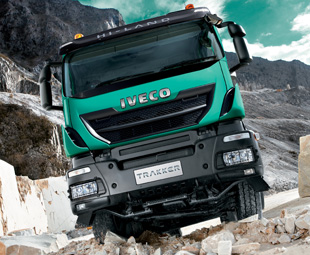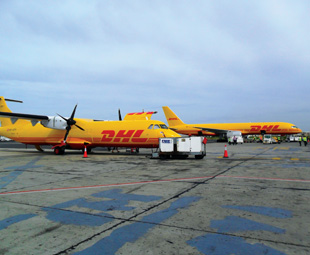All eyes on Africa

The African continent holds massive potential for growth, and is slowly realising this. CLAIRE RENCKEN looks at companies and countries that are making it happen, and how they are doing it.
It’s quite refreshing when people recognise the potential in our continent, rather than all the negatives. Craig Jordan, managing director of Truck Centre, is one of Africa’s number one fans: “We love doing business in Africa. It has a certain charm that more established economies lack. Yes, it’s tough and challenging, but maybe this is what makes it so satisfying.”
Jordan adds: “The Truck Centre Group has its businesses firmly entrenched in Zambia and in the southern Democratic Republic of Congo (DRC). When I talk to any of my customers, or potential customers, it is important for them to know that once they enter these areas, they can have complete peace of mind when it comes to technical support and after-sales assistance.”
In Zambia, the Group has established a network in Lusaka and Ndola and is now looking at Chililabombwe in the copper-belt. In the DRC, Truck Centre dealerships can be found in Lubumbashi, Fungurume and Kolwezi. Jordan explains: “These support hubs cater for many companies, mostly South African, operating the route and utilising our Iveco or Astra products. However, we are also supporting and servicing many companies that are operating alternate truck brands.”
Truck Centre operates similar services in Tete and Nacala in Mozambique. Jordan enthuses: “This region is experiencing tremendous growth and our Group is excited to be involved. Our philosophy is fairly simple: we set up local companies in these regions and using our knowledge, experience and expertise, we involve and employ people from the local community. For the first couple of years we focus on training and skills transfer. There are often limited numbers of expats in these regions, so we need to build up good, reliable local teams.”
Jordan regards South Africa as a gateway into the rest of Africa: “I believe the reason we have been successful is our focus on our base in South Africa. This has to be a strong and supportive platform to cater for these hubs. Parts, finance and technical support are on hand when required. Logistics become critical to ensure that parts or equipment arrive at the right price and, most importantly, at the right time. Our driver academy also provides ongoing training for our customers’ drivers in these regions on both theoretical and practical levels.”
He truly believes South Africa has a lot to offer and that international companies are starting to realise this, and will engage with more and more local companies to create opportunities in the future.
 Moving east, Kenya has been making the news. Many believe the east African economy is also on the brink of a new era of opportunities, growth and development. The company, Beyond Africa Logistics Consultants, is poised to provide logistical solutions to those wanting to enter this vibrant market, having established its Kenyan office a year ago. It establishes collaborative relationships with customers and suppliers to improve communications and efficiency in the overall management of trade flow logistics from supplier to purchaser – using air, road, sea or rail options.
Moving east, Kenya has been making the news. Many believe the east African economy is also on the brink of a new era of opportunities, growth and development. The company, Beyond Africa Logistics Consultants, is poised to provide logistical solutions to those wanting to enter this vibrant market, having established its Kenyan office a year ago. It establishes collaborative relationships with customers and suppliers to improve communications and efficiency in the overall management of trade flow logistics from supplier to purchaser – using air, road, sea or rail options.
There is growing investor confidence in a better performing economy, with the Kenya Investment Authority data showing new investments of US$68 million (R751,8 million) in the second quarter of 2013, compared with US$58,8 million (R650 million) in the first quarter.
The African Development Bank says the economy grew by 5,2 percent in the first quarter of 2013, compared with 3,9 percent in the same quarter the previous year, with an estimated overall growth of six percent in 2013, driven mainly by increased investments, tourism and exports.
“We turn logistical challenges into competitive advantages,” explains Michelle du Toit, director of operations at Beyond Africa Logistics Consultants. “Our target industries are the very ones that are driving the expected growth of Africa in the 21st century – food and beverage; mining; drilling and exploring; power and water; engineering and construction; agriculture; pharmaceuticals and telecommunications.
“Having serviced Kenya and now Tanzania, Burundi, Rwanda, Uganda, DRC and South Sudan by road, we are able to offer the complete logistics solution from air or sea destinations across Africa.”
She adds: “The southern African countries are also important to us – our head office is in South Africa, which allows us to monitor our business across the country and into all the Southern African Development Community (SADC) states. We are growing quite rapidly in the western and central African regions.”
The World Bank recently raised its economic outlook for sub-Saharan Africa for the next 12 months, predicting that the region will grow by more than five percent because of strong domestic demand and higher production of commodities. This adds to the International Monetary Fund’s prediction that growth rates for emerging economies will be higher than those of advanced economies.
In terms of air transport in western Africa, DHL made the news late last year, when it announced an investment in a facility and infrastructure in that area, to meet the demand for express and freight services in the region. The investment includes the launch of a new airside facility in Dakar, Senegal, and the addition of three aircraft – a Boeing 757 and two ATR72s.
The express operator, which already boasts a large hub in Lagos, Nigeria, opened the facility in early November 2013, to handle increased transit volumes. The facility will enable the handling of material destined for Senegal and transit material through Dakar. It will help improve the quality of the service delivered to a market with ever increasing activity and consistently under time pressure.
The two ATR 72s, each with a capacity of seven tonnes, will connect countries including Senegal, Guinea, Sierra Leone, Liberia, Cote d’Ivoire, Mali and Mauritania. These aircraft are ideal, as they have large cargo doors and provide a fully palletised loading capability, making them more efficient for handling of freight.
And it would seem DHL’s focus on Africa is paying off. On January 21 it was announced that the company had received the Frost & Sullivan Award for Market Penetration in Sub-Saharan Africa, owing to its vast expansion programme in Africa and its continued commitment to the continent.
Frost & Sullivan business unit leader for energy and environment, Cornelis van der Waal, says: “DHL’s foray into the informal retail market and its partnership with postal operators has seen the company more than quadruple its retail outlets across the continent in just a few months. It is an impressive story, and one that needs to be recognised.”
Sumesh Rahavendra, head of marketing for DHL Express sub-Saharan Africa, says that the company expanded from 300 to over 2 000 retail points in Africa owing to demand from its customers.
In conclusion, I think Jordan says it best: “Africa is no longer just hot, hostile and rife with poverty and corruption, but also attractive and incredibly inspiring in terms of business opportunities.” Viva optimism, viva Africa!
Published by
Focus on Transport
focusmagsa




